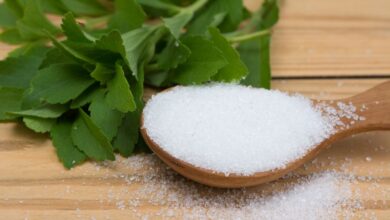Erythritol – The Low-Calorie Sugar Substitute

Erythritol is a sugar alcohol commonly used as a substitute for sugar. It occurs naturally in some fruits and fermented foods. It has a sweet taste but fewer calories than sugar, making it popular in sugar-free and low-calorie products. Erythritol is also known for being tooth-friendly and causing less digestive distress compared to some other sugar alcohols. One gram of erythritol contains 0.24 calories, while regular sugar contains 4 calories per gram.
Erythritol belongs to the sugar alcohol family, also known as polyols, formed through the hydrolysis of the aldehyde or ketone group in various carbohydrates. In sugar alternative studies, erythritol stands out due to its challenging production compared to other polyols. It cannot be chemically synthesized in an economically viable way, leading to a shift toward biotechnological production. Research efforts have focused on improving concentration, productivity, and yield in this area.
Due to its unique chemical structure, most sugar alcohols pass unchanged through much of the digestive system into the colon, where they ferment with the help of resident bacteria. This can produce gases as a byproduct and may cause bloating and digestive disorders. In fact, sugar alcohols like erythritol fall into the category of fibers.
Erythritol differs from other sugar alcohols as most of it is absorbed into the bloodstream before reaching the colon. It circulates in the blood for some time and is eventually excreted unchanged in urine. About 90% of erythritol is excreted in this way.
Studies on feeding, providing 0.7 to 1 gram per kilogram of body weight, show that erythritol is well-tolerated. However, an older study indicated that a single dose of 50 grams of erythritol increased nausea and stomach rumbling.
Animal studies have found that erythritol inhibits the rise in blood sugar and insulin levels. For people with overweight, diabetes, or other metabolic syndrome-related issues, erythritol seems to be an excellent sugar alternative.
Harmful bacteria in the mouth use sugar for energy, producing acids that can erode tooth enamel. As a result, sweet-tasting sugar alcohols like xylitol and erythritol have found their place in tooth-friendly products, as oral bacteria cannot use them for energy.
Xylitol and erythritol also directly suppress the growth of bacteria. However, erythritol performs better and is more effective in inhibiting the growth of oral bacteria than other sugar alcohols, including xylitol.


